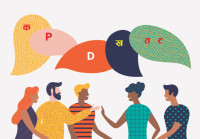As it is
The power of language and how it impacts life
Do words have power within themselves or do they generate power when they are used by people in power?
Bhupa P Dhamala
There are so many things that look simple but can have serious impacts on our life without our knowing. Have we ever wondered, for instance, how language affects our daily life? To take a few examples, when a speaker says, "Bring me a glass of water", or "Open the window, please", or "Would you mind typing this letter for me?", how does the intended listener react to it? Does s/he quickly fulfil or outrightly deny such requests or commands that are sometimes made blatantly and sometimes politely? And what is this decision based on? This set of questions about the listeners’ behaviour leads to another set of important questions about the function and power of language, like where does the power of language to move the listener do specified activities like fetching a glass of water or opening the window come from? In other words, do words have power within themselves or do they generate power when they are used by people in a powerful position? And why is it that some expressions, words, commands, or requests are so impactful on our lives? This write-up tries to seek simple answers to these plausible questions.
Word as a loaded weapon
Language is by no means just a means of communication for mundane aspects of life, but it is also a vehicle of power. A word becomes powerful when used by a powerful person. As Karl Sornig (1989) said, "Words can, in fact, be used as instruments of power and deceptions, but it is never the words themselves that should be dubbed evil and poisonous, as has become the fashion". In this sense, a word can be defined as a loaded weapon which can be used for effective speech. But it is useful to know how words function as a loaded weapon. While a physical weapon can kill someone by virtue of its physical force, a word can fulfil the intended purpose—ill or good—of its speaker by virtue of its cognitive force. Just as a weapon has no intention in itself to kill anybody, but it has the power to hit and hurt people when it is used by a warrior, a word too has no intrinsic desire to hurt the hearer's feelings, but it is an ideologically loaded weapon to impact people's minds when used by an interested and skilled speaker. Therefore, speakers who are trained and knowledgeable on negotiating the power of language can use language to serve their desired purpose or interest. In this sense, a word is a loaded weapon.
Impacts on ordinary life
Since language is ubiquitous, we cannot escape it. And all language is used to produce some effect—serious or not so serious but impacting in some way—on the listener. An eminent British philosopher JL Austin in his book How to Do Things with Words (1955) said that virtually all speech is made to get the things done; every expression is a speech act; even the ordinary expression has some elocutionary force which can produce an effect on the hearer. We can illustrate this point with some common examples: when the police say, "You are under arrest", the accused cannot escape. When the judge in a court says, "It is so decided", it becomes a verdict which has to be obeyed. When a Christian priest in the church says, "I now pronounce you man and wife", a man and a woman are declared to get married. When a Muslim man says to his wife, "talak, talak, talak!" they are said to get divorced. These expressions look quite simple in themselves but are quite powerful. There are countless such expressions, and while some of them can have significant impacts on our lives, the impact of some are only minimally felt. But regardless of the intensity of the effect, no speech is without an effect altogether.
Impact of political catchwords
The most visible effects of language can be seen in the field of politics. In our lifetime we have heard hundreds of speeches made by politicians where they speak to the audience to persuade them to be organised in their parties, or they ask citizens to vote for them in the election. And the political leaders persuade millions of people by using common catchwords like freedom, liberty, equality and social justice. Ideas like gender equality, social inclusion, and people's welfare have become more recent catchphrases. And there are also the classically famous and effective catchphrases like "great sacrifice for the nation", "martyrs will straight go to heaven", "putting the people's interests first", "vote for me and your life will be different". It is important to understand that by means of such language, politicians are constructing ideologies and using these constructed ideologies to win favours from people. Using attention-catching words is the easiest and the most effective way politicians persuade people to follow them. Almost all politicians use such catchphrases and it is difficult to locate a politician who is arrogant or ignorant enough to not use these catchwords. As a matter of fact, just like there is no escape to politics, there is no escape to the political nature of language either, be it in the context of organised politics or the current of everyday affairs. And once such political nature of language is identified and understood, it also becomes easier to understand how language impacts and informs our choices, our actions, and our worldviews.




 13.12°C Kathmandu
13.12°C Kathmandu










